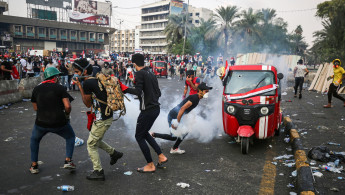Amnesty calls on Iraq to stop using new tear gas grenades which kill protesters
The human rights organization Amnesty International has said that Iraqi security forces are using new and deadly tear gas grenades that can pierce human skulls in their crackdown against anti-government protesters.
Gruesome videos have been posted on social media networks showing the burn injuries and head wounds inflicted by these grenades and Amnesty said that its Digital Verification Corps had geolocated and analyzed video evidence from near Tahrir Square in Baghdad.
A military expert with the Corps said that the tear gas grenades were variants from Bulgaria and Serbia, modelled on military grenades and up to 10 times heavier than standard tear gas canisters.
This made them able to cause horrific injuries and death when launched directly at protesters.
Read more: Why are people protesting in Iraq?
“All the evidence points to Iraqi security forces deploying these military-grade grenades against protesters in Baghdad, apparently aiming for their heads or bodies at point-blank range. This has had devastating results, in multiple cases piercing the victims’ skulls, resulting in gruesome wounds and death after the grenades embed inside their heads,” said Lynn Maalouf, Amnesty International’s Middle East Research Director.
Amnesty said that Iraqi security forces must immediately stop using the deadly grenades.
“The lack of accountability for unlawful killings and injuries by security forces, responsible for the vast majority of casualties this past month, is sending the message that they can kill and maim with impunity. The authorities must rein in the police, ensure prompt, impartial, effective investigations, and prosecute those responsible,” Maalouf added.
Twitter Post
|
Amnesty International interviewed nine witnesses, including protesters and medical volunteers, who described the Iraqi security forces use of the grenades in Tahrir Square.
The witnesses said that earlier in October security forces had thrown standard tear gas canisters, but switched to the deadly grenades – which protesters have called “smokers” - around 25 October, causing an increased number of deaths and injuries.
More than 250 people have been killed in the protests and nearly 8,000 more injured.
The witnesses said that up to 10 of the grenades were fired at once into crowds of protesters, emitting a type of smoke that smelled different from any tear gas they had previously been exposed to.
One female protester told Amnesty International: “One ‘smoker’ landed close to me and I could barely breathe. It was like my chest was broken. The medical volunteers gave me a ventilator. I think I would have died. I have been exposed to tear gas before and it did not feel this way.”
A male protester said, “Since 25 October, the anti-riot [police] has not stopped launching tear gas and ‘smokers’ into the crowd, whether provoked or not. It is continuous and random. … They are not using them to disperse, they are using them to kill. All the deaths in Baghdad have been from these canisters going inside the protesters’ bodies. They do not think about the fact that there are families and children in the crowds.”
Another protester said that his friend was killed after being hit in the head with one of the grenades on 28 October.
The two types of deadly grenades have been identified as Serbian 40mm M99s manufactured by Balkan Novotech, and 40mm LV CS grenades, likely manufactured by Bulgarian company Arsenal. These are not designed for riot control but for military combat and are extremely hazardous to human beings.
A forensic pathologist confirmed to Amnesty International that they had “never seen such severe injuries from this cause before”. The expert noted that “the severity of injury and the angles of entry” strongly suggest the grenades were fired directly at the victims rather than ricocheting off the ground.
Protests against government corruption, unemployent, and poor public services have been ongoing in Iraq since last month. There have been indications that Prime Minister Adel Abdel Mahdi may resign, after his erstwhile parliamentary allies turned against him recently.
Follow us on Twitter: @The_NewArab





 Follow the Middle East's top stories in English at The New Arab on Google News
Follow the Middle East's top stories in English at The New Arab on Google News
![Both Hamas and the Palestinian Authority welcomed the ICC arrest warrants [Getty]](/sites/default/files/styles/image_330x185/public/2024-11/GettyImages-2178351173.jpg?h=199d8c1f&itok=TV858iVg)

